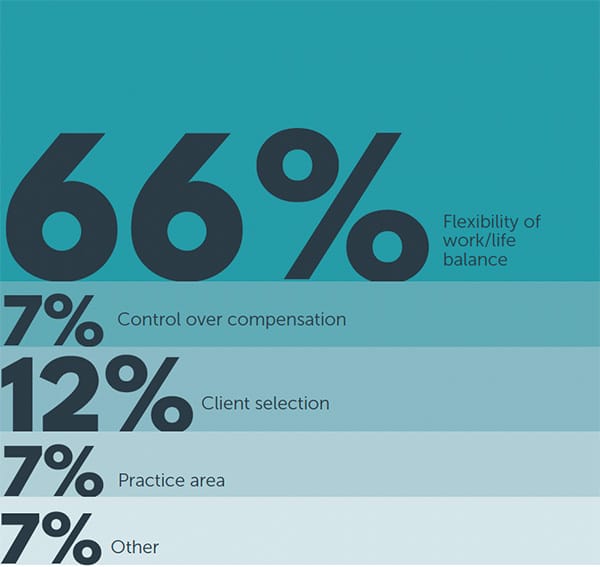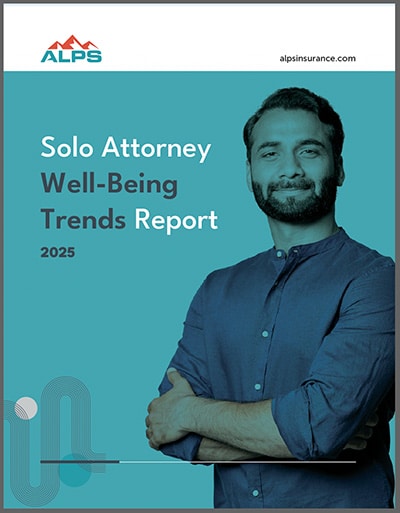In a profession long plagued by burnout, stress and mounting dissatisfaction, a surprising outlier has emerged: the solo attorney. According to ALPS Insurance’s 2025 Solo Attorney Well-Being Trends Report, a substantial number of solo practitioners are not only surviving — they’re thriving.

Table of contents
- Redefining What It Means to Thrive
- More Than Just Happy — Healthier, Too
- Counterintuitive Findings: Less Lonely and More Resilient Than Expected
- A Shift in the Legal Landscape
- Bar Associations and Insurers: A Role to Play
- Looking Ahead: A Roadmap to Resilience
- Read the Solo Attorney Well-Being Report
- Practice Tips for Solo Attorneys on Attorney at Work
The first-of-its-kind report, focusing exclusively on the solo attorney experience, reveals that 74% of solos are satisfied or very satisfied with their careers. This stands in stark contrast to recent industrywide reports highlighting alarming levels of dissatisfaction and attrition within traditional law.
But what is it about being a sole practitioner that supports well-being?
Redefining What It Means to Thrive
The 2025 Solo Attorney Well-Being Report stems from a nationwide survey of nearly 300 solo practitioners, all ALPS policyholders. The data paints a picture of a happier and more grounded legal demographic — one that may offer a roadmap to greater satisfaction in the profession.
“It’s both refreshing and important to see empirical evidence suggesting that solo practitioners report higher satisfaction, especially in the context of broader well-being challenges across the legal profession,” said Chris Newbold, ALPS COO and a long-time attorney well-being advocate. “Themes like autonomy, flexibility, and work-life integration aren’t just buzzwords. They’re shaping healthier, more fulfilling careers.”

Indeed, when asked, “If you could only choose one, what is the most valuable benefit of operating your own solo practice?” flexibility was cited as the top benefit of solo practice, with lawyers pointing to greater control over their schedules, caseloads and even client selection.
According to Newbold, this autonomy allows solos to better prioritize personal values — whether that means showing up for a child’s choir concert or taking the occasional afternoon for self-care.
More Than Just Happy — Healthier, Too
The narrative doesn’t stop at professional satisfaction. The Solo Attorney Well-Being Report also found that solos are more proactive about their well-being, frequently engaging in healthier lifestyle choices, including regular exercise, sleep hygiene and mindfulness practices.
In a profession known for its rigid structures and 24/7 work cycles, the ability to disconnect — without guilt — is a major shift.
“Solos are setting the tone for a more human-centered approach to lawyering,” said Rio Laine, ALPS Director of Strategic Partnerships and bar association liaison. “They’ve created a professional life that suits who they are, not just what the industry expects.”
Counterintuitive Findings: Less Lonely and More Resilient Than Expected
Solo attorneys report low levels of loneliness.
This finding surprised even the ALPS research team. While the assumption is often that working solo means isolation, the report tells a different story: Most solos have strong professional networks, community ties, and familial support systems that keep them connected.
Newbold believes this is especially true for lawyers who entered solo practice later in their careers, after building years of relationships in other firm environments. “They aren’t just hanging a shingle on day one,” he noted. “They’ve met colleagues, co-counseled, built referral networks — and they’re leveraging those relationships.”
Burnout Still Exists — But It’s Recognized and Manageable
Of course, the practice of law is not without stress. About 44% of respondents acknowledged experiencing burnout at some point. Yet, unlike many in traditional firms, solos appear better equipped to recognize and manage that stress, thanks in part to the flexibility and autonomy their roles afford.
“When you control your own caseload, you can recalibrate,” said Newbold. “But it takes self-awareness. Solos have to be intentional about workload and avoid overextending themselves, especially early on.”
Technology also plays a growing role here. Practice management platforms and AI-driven tools are increasingly used to streamline administrative tasks, reduce overhead, and free solos to focus more on client work and less on the operational burden.
A Shift in the Legal Landscape
The ALPS report arrives at a moment of reckoning in the legal industry. Following the pandemic, many attorneys began questioning the demands of Big Law and seeking better work-life integration. This trend, often referred to as “The Great Reassessment,” has accelerated interest in solo practice, government roles and J.D.-adjacent career paths.
According to a 2024 Bloomberg Law Well-Being Report, nearly half of all large firm respondents are open to leaving their jobs in pursuit of better work-life balance. ALPS’ findings suggest that solo practice might be the destination they’re searching for.
The trend doesn’t stop with mid-career professionals. Law students and young lawyers are increasingly asking bold questions in interviews about firm culture, mental health support, and flexibility. As Newbold observed, “That didn’t used to happen. Now it’s becoming a norm.”
“There’s definitely a lot to be said for taking care of yourself so you can do the best work possible,” said Laine during the podcast. “It’s something that’s been difficult for lawyers to prioritize — but it’s finally coming to the forefront.”
Bar Associations and Insurers: A Role to Play
Despite the positive tone of the report, Newbold cautions against complacency. Only 22% of survey respondents who experienced high stress reported seeking mental health support — a stark reminder that stigma still lingers in legal circles.
“We have more work to do,” Newbold said. “Bar associations and insurers alike must create environments where asking for help is normalized and supported. That includes offering wellness resources, mentorship, and community-building initiatives tailored to solos.”
Looking Ahead: A Roadmap to Resilience
Asked what he sees for the future, Newbold remains optimistic. “The societal, technological and generational stars are aligning,” he said. “If we can continue normalizing self-care, reduce stigma and expand access to wellness tools, I think more lawyers will stay in the profession — and be proud to do so.”
That pride is something Newbold says he’s determined to foster, especially among young lawyers. “It pains me to see seasoned professionals who regret going to law school. I want us to change that. I want lawyers — especially solos — to look back and say, ‘This was the best decision I ever made.’”

Read the Solo Attorney Well-Being Report
Explore the complete findings in the ALPS Insurance 2025 Solo Attorney Well-Being Trends Report. ALPS Insurance is the nation’s leader in insurance for solo and small law firms. Learn more at www.alpsinsurance.com.
Practice Tips for Solo Attorneys on Attorney at Work
Finding Work-Life Balance as a Solo: Ethics Tips
Delegation Isn’t Just a Work Hack, It’s a Life Hack: 5 Personal Tasks to Delegate Now
Unlocking the Full Potential of Your Legal Practice: How Lawyers Can Leverage Legal Service Plans
Small Firm Growth Strategy: Do These 8 Things for Your Solo Practice















